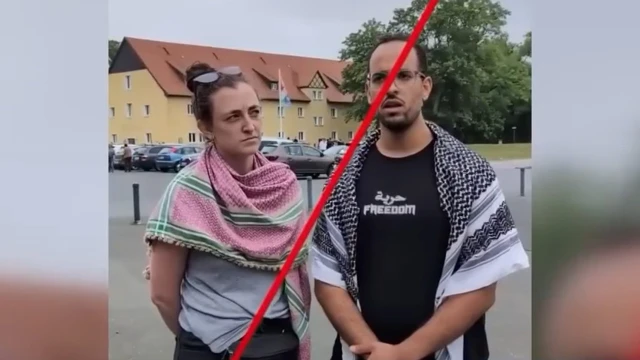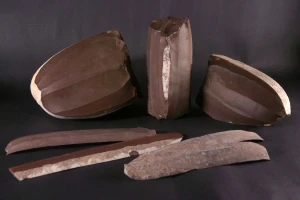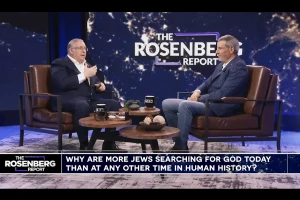German court upholds ban on keffiyeh scarf at Buchenwald Memorial

Keffiyehs have been banned at the Buchenwald Memorial - the site of the former concentration camp in Germany - following disruption at a Holocaust commemoration event by pro-Palestinian activists.
Members of a small communist organization in Germany that celebrated the Oct. 7 massacre tried to sabotage the event by making comparisons between the Holocaust and the war in Gaza, which led to the decision.
“We wanted to enter the memorial site and they stopped us,” one of the protesters explained. “They told us we are not allowed to enter the site with keffiyehs or with shirts that make reference to Palestine.”
Described by some as a "hipster swastika," the keffiyeh has become an increasingly recognized symbol of Palestinian resistance. The fishnet scarves have become a familiar sight at protests, but a German court ruled to ban them from the sensitive site as the protesters were attempting to politicize the Holocaust, according to a report by Dov Gil-Har for KAN News.
The director of the Buchenwald site, Jens-Christian Wagner, explained his decision to prevent the activist from entering: “She wanted to instrumentalize the victims of Buchenwald and the victims of the Shoah to protest against the actual, or alleged, genocide in Gaza, and that's not okay,” he said.
While there is great freedom of expression in Germany, there is little tolerance for expressions of antisemitism, denial of Israel’s right to exist, or distortion of the Holocaust. According to Jens-Christian “There is no place for comparison, and therefore the keffiyeh remained outside.”
Clarifying the red line he has drawn, he affirmed freedom of speech, saying, “Of course you can, and it's legitimate, to criticize the IDF, what the IDF is doing in the Gaza Strip. But what we can't tolerate is that the Holocaust and the Nazi crimes are being equalized with what is happening in the Gaza Strip.”
The name of the keffiyeh scarf originated in the city of Kufa in Iraq in the seventh century, with the design of a fishing net and water connected to the Euphrates river. Different variations are worn throughout the Middle East, with those worn in the Gulf States typically being plain white while the King of Jordan wears a red and white version. The black and white design was created by a British Lieutenant General, John Bagot Glubb, during the time of the British Mandate. It has become popularized as representative of the Palestinian cause by Yasser Arafat, leader of the PLO.
By drawing the comparison between Gaza and the Holocaust, Palestinian activists are effectively equating Israel with the Nazis. Jens-Christian explained his objection to the strategy of the communist group:
“The attempt to claim that what is happening in Gaza is genocide, the futile attempt to compare then to Gaza now. The attempt to play on the German conscience: You are guilty of two genocides, to put it that way,” he said.
Describing their intentions, he relayed their statements: “We are here to mark and to make a statement about the genocide taking place in Gaza.” He then explained his conviction that such activity was wholly inappropriate at the site, “In the place where the genocide occurred, one of the largest in Germany.”
Last April, Buchenwald Memorial marked 80 years since the Americans entered and liberated the camp. Now a German district court has ruled – not once, but twice – that those wishing to protest against Israel will not be allowed to do so inside former concentration camps.

Jo Elizabeth has a great interest in politics and cultural developments, studying Social Policy for her first degree and gaining a Masters in Jewish Philosophy from Haifa University, but she loves to write about the Bible and its primary subject, the God of Israel. As a writer, Jo spends her time between the UK and Jerusalem, Israel.
You might also like to read this:











